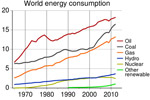A campaign to persuade investors to take their money out of the fossil fuel sector is growing faster than any previous divestment campaign and could cause significant damage to coal, oil and gas companies, according to a study from the University of Oxford.
The report compares the current fossil fuel divestment campaign, which has attracted 41 institutions since 2010, with those against tobacco, apartheid in South Africa, armaments, gambling and pornography. It concludes that the direct financial impact of such campaigns on share prices or the ability to raise funds is small but the reputational damage can still have major financial consequences.
“Stigmatization poses a far-reaching threat to fossil fuel companies—any direct impacts of divestment pale in comparison,” said Ben Caldecott, a research fellow at the University of Oxford’s Smith School of Enterprise and the Environment, and an author of the report. “In every case we reviewed, divestment campaigns were successful in lobbying for restrictive legislation.”
The report is part of a new research program on stranded assets backed by Aviva Investors, HSBC, Standard & Poor’s and others. It found: “The fossil fuel campaign has achieved a lot in the relatively short time since its inception.”
Some major investors, such as the $74bn Scandinavian asset manager Storebrand, have already pulled their funds from coal stocks. But the researchers found that even if the maximum possible capital was divested by university endowments and public pension funds, the total was relatively small compared to the market capitalization of traded fossil fuel companies and the size of state-owned enterprises.
 Oil industry flaring gas on the Napo River in the Amazon rainforest. Photo by: Jeremy Hance.
Oil industry flaring gas on the Napo River in the Amazon rainforest. Photo by: Jeremy Hance.
However, the team concluded: “The outcome of the stigmatization process, which the fossil fuel divestment campaign has now triggered, poses the most far-reaching threat to fossil fuel companies and the vast energy value chain.”
Analyzing previous campaigns, the researchers found examples of stigmatized companies being shunned by governments and being barred from public contracts or acquiring licenses. “Stigma attached to merely one small area of a large company may threaten sales across the board,” the report found, citing the examples of Motorola dumping its defense business due to bad press and Revlon’s decision to disinvest from its South African operation after customer groups threatened a boycott.
The report also found instances when customers, suppliers and potential employees were scared off by stigma and where stigma had led shareholders to demand changes in the management of companies.
Bill McKibben, the environmental campaigner who leads the 350.org divestment campaign which is expanding from the US into Europe this autumn, said: “This divestment campaign is just one front in the climate fight, but of all the actions people can take to bring about structural change, it’s probably the easiest. Severing our ties with the guys digging up the carbon won’t bankrupt them–but it will start to politically bankrupt them, and make their job of dominating the planet’s politics that much harder.”
A report in April backed by climate economist Lord Stern found that at least two-thirds of the fossil fuels listed as assets by the world’s fossil fuel companies would have to remain in the ground if governments were to fulfill their pledge of keeping climate change below the danger limit of 2C. The UN’s Intergovernmental Panel on Climate Change (IPCC), backed by 193 governments, reached a similar conclusion at the end of September.
David Nussbaum, chief executive at WWF-UK, said: “With the IPCC giving us the clearest signal yet of the threats posed by a changing climate, it’s clear that we must consider the risks to businesses and investors posed by investments in fossil fuels. Prudent investors want to be ahead of pack, not following the herd, so they will be preparing for a world where we leave fossil fuels in the ground.”
 Shell gas station in California, U.S. Photo by: Coolcaesar/Creative Commons 3.0.
Shell gas station in California, U.S. Photo by: Coolcaesar/Creative Commons 3.0.
Original story: Damian Carrington,. Campaign against fossil fuels growing, says study. The Guardian – October 7th, 2013
Related articles

(10/03/2013) The oceans are more acidic now than they have been for at least 300m years, due to carbon dioxide emissions from burning fossil fuels, and a mass extinction of key species may already be almost inevitable as a result, leading marine scientists warned on Thursday. An international audit of the health of the oceans has found that overfishing and pollution are also contributing to the crisis, in a deadly combination of destructive forces that are imperiling marine life, on which billions of people depend for their nutrition and livelihood.
Clock is ticking on fossil fuels: for first time IPCC scientists outline global carbon budget

(10/01/2013) The world’s leading climate scientists have set out in detail for the first time how much more carbon dioxide humans can pour into the atmosphere without triggering dangerous levels of climate change—and concluded that more than half of that global allowance has been used up.

(09/28/2013) Human actions are responsible for warming the Earth, reconfirms the landmark Intergovernmental Panel on Climate
Change (IPCC) report released today, the first mammoth report on the physical science of climate change issued in seven years. Scientists now say they are 95-100 percent certain that human actions—such as burning fossil fuels and cutting down forests—are behind the observed rise in global temperatures since at least 1950. Average temperatures have risen 0.85 degrees Celsius since 1880, but the new report warns that depending on how much more fossil fuels are burnt, temperature rises could exceed 4 degrees Celsius (9 degrees Fahrenheit) with untold consequences for global society.
Climate change pushing tropical trees upslope ‘exactly as predicted’

(09/27/2013) Tropical tree communities are moving up mountainsides to cooler habitats as temperatures rise, a new study in Global Change Biology has found. By examining the tree species present in ten one-hectare plots at various intervals over a decade, researchers found that the proportion of lowland species increased in the plots at higher elevations. The study, which was undertaken in Volcan Barva, Costa Rica, adds to a growing body of evidence that climate change is having an impact on species range distributions.
Global society must leave fossil fuels in the ground, unburnt, says top official
(09/26/2013) World governments must get used to the idea of leaving fossil fuel reserves in the ground unexploited and unburned, one of the world’s most senior diplomats has said, ahead of a landmark report on climate science to be unveiled this Friday by the Intergovernmental Panel on Climate Change (IPCC). The former Irish president and UN high commissioner for human rights, Mary Robinson, is to spearhead a new international push aimed at breaking the climate talks deadlock and silencing skeptics, with a group of senior diplomats and politicians from around the world.
Climate change policy is just good economics
(09/25/2013) For the majority of the new century, Americans have largely stopped caring about the environment. In that time, America has suffered 9/11, two of the nation’s four longest wars, the deepest depression in 80 years, increased inequality, and incompetent or fractured leadership. There’s been a lot on the public mind.
Climate change to hurt children most
(09/25/2013) Children will bear the brunt of the impact of climate change because of their increased risk of health problems, malnutrition and migration, according to a new study published on Monday. And food prices are likely to soar as a result of warming, undoing the progress made in combating world hunger.
Climate change could kill off Andean cloud forests, home to thousands of species found nowhere else

(09/18/2013) One of the richest ecosystems on the planet may not survive a hotter climate without human help, according to a sobering new paper in the open source journal PLoS ONE. Although little-studied compared to lowland rainforests, the cloud forests of the Andes are known to harbor explosions of life, including thousands of species found nowhere else. Many of these species—from airy ferns to beautiful orchids to tiny frogs—thrive in small ranges that are temperature-dependent. But what happens when the climate heats up?
‘Heading towards an ice-free Arctic’: sea ice extent hits sixth lowest on record

(09/18/2013) Sea ice cover in the Arctic shrank to one of its smallest extents on record this week, bringing forward the days of an entirely ice-free Arctic during the summer. The annual sea ice minimum of 5,099m sq km reached on 13 September was not as extreme as last year, when the collapse of sea ice cover broke all previous records.
African grass could substantially cut greenhouse gas emissions from livestock industry
(09/17/2013) Scientists will call for a major push this week to reduce the amount of greenhouse gas emissions from agriculture through the use of a modified tropical grass. Brachiaria grasses have been found to inhibit the release of nitrous oxide, which has a more powerful warming effect than carbon dioxide or methane, leading them to be called a super grass.
Which ecosystems are most vulnerable to climate change?
(09/16/2013) New research highlights the world’s most (and least) vulnerable ecosystems to climate change. The study, published in Nature Climate Change, is the first to combine anticipated climatic impacts with how degraded the ecosystem is due to human impacts, creating what scientists hope is a more accurate list of vulnerable regions. The most endangered regions include southern and southeast Asia, western and central Europe, eastern South America, and southern Australia.